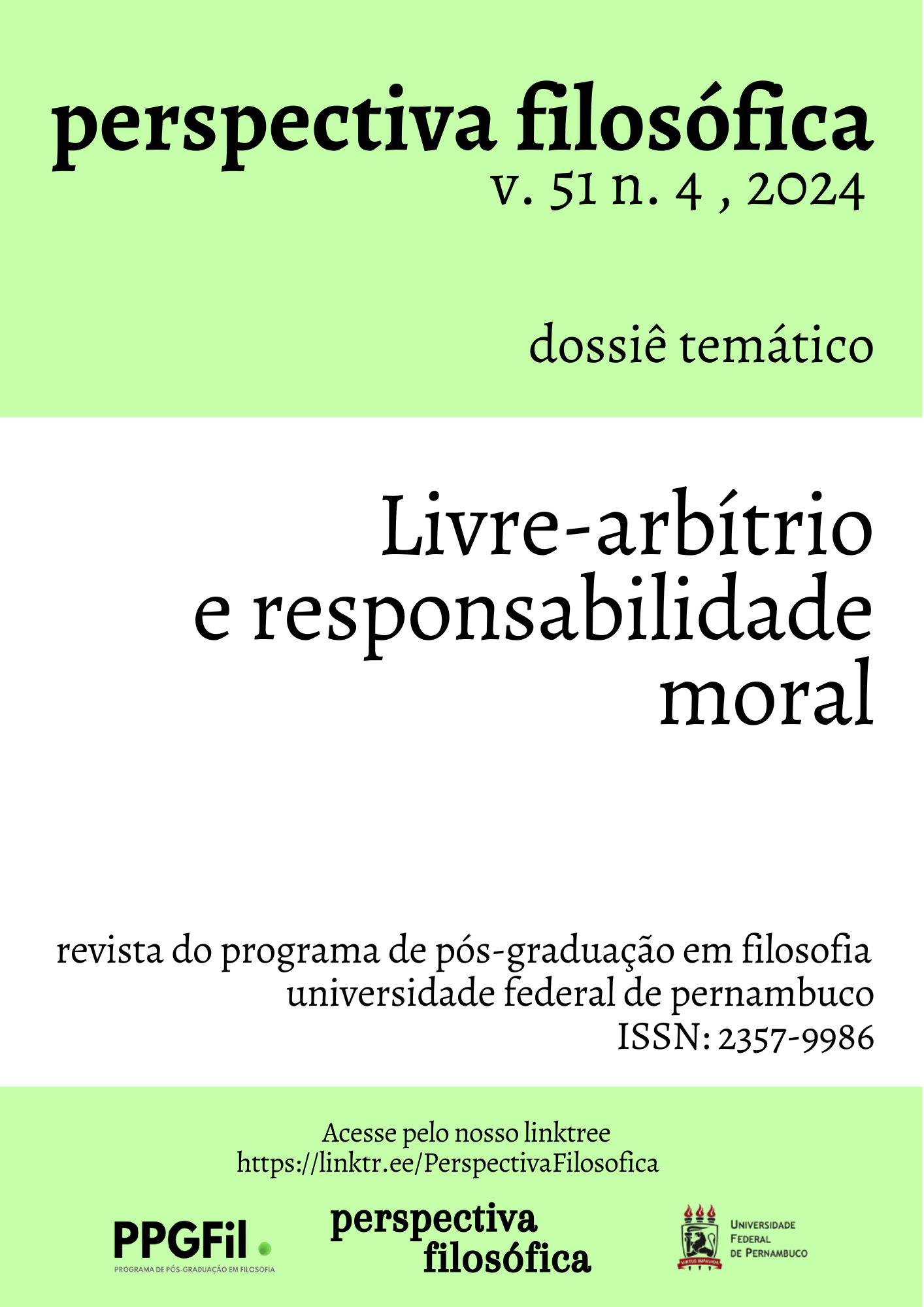Quantifying moral freedom from an informational approach
DOI:
https://doi.org/10.51359/2357-9986.2024.260441Keywords:
freedom, information, moral responsibility, quantification of freedomAbstract
We introduce a quantitative-informational definition of moral freedom. We adopt, as a point of reference, the philosophical conception according to which freedom presupposes choice, that is, selection of one action to the detriment of others. This assumption is also used in the Mathematical Theory of Communication when defining the amount of information in a source. Although they have different contents, meanings and objectives, we seek to bring together this common idea in both perspectives, applying the quantification of information to moral freedom, defined here in the context of moral responsibility from the Aristotelian perspective. We begin by presenting the adopted conception of freedom and related concepts, such as vice and virtue. Next, we expose the quantitative perspective of information. We then define the amount of freedom in a moral source and discuss some of its scope and limits.
References
ALVES, Marcos Antonio. “Uma semântica informacional para a consequência lógica”. Principia: an international journal of epistemology, Florianópolis, v. 27, n. 1, Special Issue The Logical Allien, 2023, p. 117-135. DOI: https://doi.org/10.5007/1808-1711.2023.e85659. Acesso em: 10 out. 2023.
ALVES, Marcos Antonio; VALENTE, Alan Rafael. “Informação e comunicação: a abordagem quantitativa e alguns de seus críticos”. In: ALVES, Marcos Antonio; GRÁCIO, Maria Cláudia Cabrini; MARTÍNEZ-ÁVILA, Daniel (Orgs.) “Informação, conhecimento e modelos”. Campinas: Unicamp, Centro de Lógica, Epistemologia e História da Ciência; Marília: Oficina Universitária, 2017. (Coleção CLE; v. 78), p. 111-130
ARISTÓTELES. Da interpretação. Trad. e notas de Edson Bini. São Paulo: Edipro, 2010.
ARISTÓTELES. Éthique a Nicomaque. Tradução e notas de J. Tricot. Paris: Vrin, 1984.
ARISTÓTELES. Gran etica. In: Obras de Aristóteles. Madrid: Aguilar S.A. de ediciones, 1967.
HARTLEY, Ralph. “Transmission of information”. Bell System Technical Journal, v. 7, p. 535-563, 1927.
HERSHBERGER, William. Principles of communication systems. New York: Prentice-Hall, 1955.
IRWIN, Terence. “Reason and responsibility in Aristotle”. In: RORTY, Amélie (Ed.) Essays on Aristotle’s Ethics. London: University of California Press, 1980. p. 117 – 155
KANT, Immanuel. Fundamentação da metafísica dos costumes. Lisboa: Edições 70, 2002.
LAPLACE, Pierre S. “Probability”. In: HUTCHINS, Robert M., ADLER, Mortimer J., FADIMAN, Clifton (Eds.). Gateway to the great books. - Mathematics. Chicago: Encyclopaedia Britannica, 1990.
LECLERCQ, Jacques. As grandes linhas da filosofia moral. Trad.: Campos, R., São Paulo: Editora Herder, 1967.
MILL, John Stuart. A Liberdade / Utilitarismo. São Paulo: Martins Fontes, 2000.
ROSS, Wiliam David. Aristotle. Paris: Payot, 1930
SHANNON, Claude; WEAVER, Warren. The mathematical theory of information. Urbana: University of Illinois Press, 1949.
ZINGANO, Marco. Aristóteles. Ethica Nicomachea I13-III8: Tratado da Virtude Moral. São Paulo: Odysseus, 2008.
Downloads
Published
Issue
Section
License
Copyright (c) 2024 Marcos Antonio Alves

This work is licensed under a Creative Commons Attribution 4.0 International License.
A Revista Perspectiva Filosófica orienta seus procedimentos de gestão de artigos conforme as diretrizes básicas formuladas pelo Conselho Nacional de Desenvolvimento Científico e Tecnológico (CNPq). http://www.cnpq.br/web/guest/diretrizesAutores que publicam nesta revista concordam com os seguintes termos:
Os autores mantém os direitos autorais e concedem à revista o direito de primeira publicação, sendo o trabalho simultaneamente licenciado sob https://creativecommons.org/licenses/by/4.0/deed.pt_BR que permite o compartilhamento do trabalho com reconhecimento da autoria e publicação inicial nesta revista.
Os autores têm autorização para assumir contratos adicionais separadamente, para distribuição não-exclusiva da versão do trabalho publicada nesta revista, com reconhecimento de autoria e publicação inicial nesta revista (Consultar http://opcit.eprints.org/oacitation-biblio.html).

Esta revista está licenciada com uma Licença Creative Commons Atribuição 4.0 Internacional.













